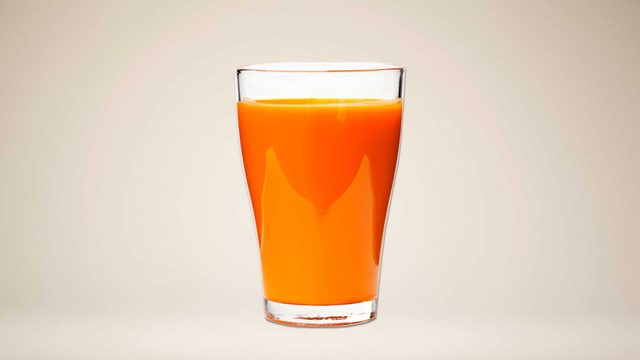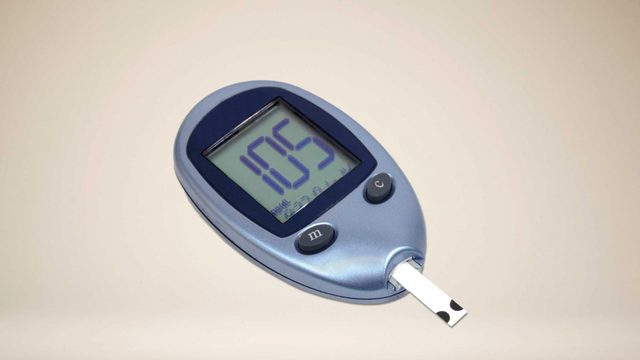
Apple cider vinegar can help tummy troubles
One of the oldest apple cider vinegar uses in the book is to take it to fix tummy woes. For an upset stomach, try sipping some apple cider vinegar mixed with water. If a bacterial infection is at the root of your diarrhea, apple cider vinegar could help contain the problem, thanks to its antibiotic properties. What’s more, some folk remedy experts contend that apple cider vinegar contains pectin, which can help soothe intestinal spasms. Try mixing one or two tablespoons into water, or clear juice like apple juice. Some people like taking it straight instead—but this is why you shouldn’t be drinking apple cider vinegar shots.

Apple cider vinegar may help cure hiccups
Try a teaspoonful of apple cider vinegar; its sour taste could stop a hiccup in its tracks. One teen took the hiccup remedy further and created a lollipop that includes apple cider vinegar, which she says “cancels out the message to hiccup” by overstimulating the nerves in the throat responsible for the spasms. If that fails, try these tricks to get rid of hiccups, once and for all.

Apple cider vinegar helps soothe a sore throat
As soon as you feel the prickle of a sore throat, employ germ-busting apple cider vinegar to help head off the infection at the pass. Turns out, most germs can’t survive in the acidic environment vinegar creates. Just mix 1/4 cup apple cider vinegar with 1/4 cup warm water and gargle every hour or so.

Apple cider vinegar could lower cholesterol
More research is needed to definitively link apple cider vinegar and its capability to lower cholesterol in humans, but one 2006 study found that the acetic acid in the vinegar lowered bad cholesterol in rats. Also, a Japanese study found that half an ounce of apple cider vinegar a day lowered cholesterol in people who participated in the panel. Another human study from Harvard found that women who ate salad dressings with vinegar had a reduced risk of heart disease. For recipe inspiration, check out these 12 apple cider vinegar recipes you’ll love adding to your diet.

Apple cider vinegar may help prevent indigestion
Sip before eating, especially if you know you’re going to indulge in foods that will make you sorry later. Try this folk remedy: add 1 teaspoon of honey and 1 teaspoon apple cider vinegar to a glass of warm water and drink it 30 minutes before you dine.

Apple cider vinegar clears a stuffy nose
Next time you’re stuffed up from a cold, grab the apple cider vinegar. It contains potassium, which thins mucus; and the acetic acid in it prevents germ growth, which could contribute to nasal congestion. Mix a teaspoon of apple cider vinegar in a glass of water and drink to help sinus drainage. Or, try our recipe for Firey Cider and kick that cold — or hangover to the curb.

Apple cider vinegar may aid in weight loss
Apple cider vinegar can help you lose weight. Here’s why: The acetic acid suppresses your appetite, increases your metabolism, and reduces water retention. Scientists also theorize that apple cider vinegar interferes with the body’s digestion of starch, which means fewer calories enter the bloodstream. But the research on its effect on weight is still unclear.

Apple cider vinegar gets rid of dandruff
Apple cider vinegar benefits the skin as well as the body. On his website, Dr. Mehmet Oz recommends apple cider vinegar as a dandruff treatment. The acidity of apple cider vinegar changes the pH of your scalp, making it harder for yeast to grow. Mix 1/4 cup apple cider vinegar with 1/4 cup water in a spray bottle, and spritz on your scalp. Wrap your head in a towel and let sit for 15 minutes to an hour, then wash your hair as usual. Do this twice a week for best results. Need more help? Here are 11 more home remedies for dandruff.

Apple cider vinegar clears acne
Apple cider vinegar makes a great natural toner that can act as a natural home remedy for acne and leave skin looking healthier. Its antibacterial properties help keep acne under control, and the malic and lactic acids found in apple cider vinegar soften and exfoliate skin, reduce red spots, and balance the pH of your skin.

Apple cider vinegar could boost energy
Exercise and sometimes extreme stress cause lactic acid to build up in the body, causing fatigue. Interestingly, the amino acids contained in apple cider vinegar act as an antidote. What’s more, apple cider vinegar contains potassium and enzymes that may relieve that tired feeling. Next time you’re beat, add a tablespoon or two of apple cider vinegar to a glass of chilled vegetable drink or to a glass of water to boost your energy.

Apple cider vinegar can cut down on nighttime leg cramps
Leg cramps can often be a sign that you’re low in potassium. Since one of the many apple cider vinegar benefits is that it’s high in potassium, one home remedy suggests mixing 2 tablespoons apple cider vinegar and one teaspoon honey to a glass of warm water and drink to relieve nighttime leg cramps. Of course, by the time you walk to the kitchen to put the drink together, your cramp is likely to be history—but maybe that’s the point.
Apple cider vinegar may also be useful around the house. Here’s how to use it.

Apple cider vinegar banishes bad breath
If proper brushing and mouthwash don’t do the trick, try the home remedy of using apple cider vinegar to control bad breath. Gargle with it, or drink a teaspoon (diluted with water if you prefer) to kill odor-causing bacteria. It might surprise some people that drinking is not a necessary part of reaping the benefits of apple cider vinegar.

Apple cider vinegar helps whiten teeth
Gargle with apple cider vinegar in the morning. The vinegar helps remove stains, whiten teeth, and kill bacteria in your mouth and gums. Brush as usual after you gargle. You can also brush your teeth with baking soda once a week to help remove stains and whiten your teeth; use it just as you would toothpaste. You can also use salt as an alternative toothpaste. If your gums start to feel raw, switch to brushing with salt every other day.

Apple cider vinegar can help fade bruises
Apple cider vinegar has anti-inflammatory properties; dabbing or laying an apple cider vinegar compress on a bruise can help fade the discolouration. But you should also find out what the colour of your bruise might be trying to tell you.

Apple cider vinegar may help control blood sugar
A few swigs of apple cider vinegar could help keep your blood sugar levels balanced, according to several studies that have shown a link between the two. One study of people with type 2 diabetes who weren’t taking insulin found that taking two tablespoons of apple cider vinegar before bed resulted in lower glucose levels by morning. Another study at Arizona State University found that insulin resistant people who drank a mixture of apple cider vinegar and water before eating a high carbohydrate meal had lower blood sugar afterward. Scientists think the anti-glycemic effect of the apple cider vinegar benefits these patients most. Now that you know all the benefits of apple cider vinegar it might be time to try it out yourself.
Next discover 15 detox foods that may actually work better than apple cider vinegar.
